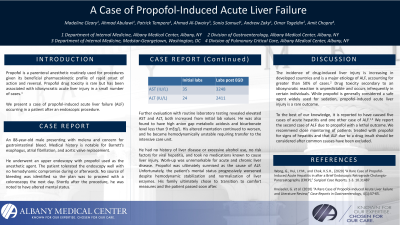Back


Poster Session E - Tuesday Afternoon
Category: Liver
E0556 - A Case of Propofol-Induced Acute Liver Failure
Tuesday, October 25, 2022
3:00 PM – 5:00 PM ET
Location: Crown Ballroom

Has Audio

Madeline K. Cleary, DO
Albany Medical Center
Albany, NY
Presenting Author(s)
Madeline K. Cleary, DO1, Ahmad Abulawi, MBBS2, Patrick J. Tempera, DO1, Ahmad Al-Dwairy, MD3, Sonia Samuel, DO1, Andrew Zaky, MD1, Omar Tageldin, MD1, Amit Chopra, MD1
1Albany Medical Center, Albany, NY; 2Albany Medical College, Albany, NY; 3Medstar Georgetown/Washington Hospital Center, Washington, DC
Introduction: Propofol is a parenteral anesthetic routinely used for procedures given its beneficial pharmacokinetic profile of rapid onset of action and reversal. Propofol drug toxicity is rare but has been associated with idiosyncratic acute liver injury in a small number of cases. To the best of our knowledge, we present the second case of propofol-induced acute liver failure (ALF) reported in literature.
Case Description/Methods: An 88-year-old male with concern for gastrointestinal bleed underwent an upper endoscopy with propofol used as the anesthetic agent. The patient tolerated the endoscopy well with no hemodynamic compromise during or afterwards. No source of bleeding was identified so the plan was to proceed with a colonoscopy the next day. Shortly after the procedure, he was noted to have altered mental status. Evaluation with routine laboratory testing revealed elevated AST of 3248 IU/L and ALT of 2411 IU/L, both increased from 35 IU/L and 24 IU/L, respectively. He was also found to have high anion gap metabolic acidosis and bicarbonate level less than 9 mEq/L. His altered mentation continued to worsen, and he became hemodynamically unstable requiring transfer to the intensive care unit. He had no history of liver disease or excessive alcohol use, no risk factors for viral hepatitis, and took no medications known to cause liver injury. Work-up was unremarkable for acute and chronic liver disease. Propofol was ultimately surmised as the cause of ALF. Unfortunately, the patient’s mental status progressively worsened despite hemodynamic stabilization and normalization of liver enzymes. His family ultimately chose to transition to comfort measures and the patient passed soon after.
Discussion: The incidence of drug-induced liver injury is increasing in developed countries and is a major etiology of ALF, accounting for greater than 50% of cases. Drug toxicity secondary to an idiosyncratic reaction is unpredictable and occurs infrequently in certain individuals. While propofol is generally considered a safe agent widely used for sedation, propofol-induced acute liver injury is a rare outcome. To the best of our knowledge, it is reported to have caused five cases of acute hepatitis and one other case of ALF. We report the second case of ALF due to propofol with a lethal outcome. We recommend close monitoring of patients treated with propofol for signs of hepatitis and that ALF due to a drug insult should be considered after common causes have been excluded.
Disclosures:
Madeline K. Cleary, DO1, Ahmad Abulawi, MBBS2, Patrick J. Tempera, DO1, Ahmad Al-Dwairy, MD3, Sonia Samuel, DO1, Andrew Zaky, MD1, Omar Tageldin, MD1, Amit Chopra, MD1. E0556 - A Case of Propofol-Induced Acute Liver Failure, ACG 2022 Annual Scientific Meeting Abstracts. Charlotte, NC: American College of Gastroenterology.
1Albany Medical Center, Albany, NY; 2Albany Medical College, Albany, NY; 3Medstar Georgetown/Washington Hospital Center, Washington, DC
Introduction: Propofol is a parenteral anesthetic routinely used for procedures given its beneficial pharmacokinetic profile of rapid onset of action and reversal. Propofol drug toxicity is rare but has been associated with idiosyncratic acute liver injury in a small number of cases. To the best of our knowledge, we present the second case of propofol-induced acute liver failure (ALF) reported in literature.
Case Description/Methods: An 88-year-old male with concern for gastrointestinal bleed underwent an upper endoscopy with propofol used as the anesthetic agent. The patient tolerated the endoscopy well with no hemodynamic compromise during or afterwards. No source of bleeding was identified so the plan was to proceed with a colonoscopy the next day. Shortly after the procedure, he was noted to have altered mental status. Evaluation with routine laboratory testing revealed elevated AST of 3248 IU/L and ALT of 2411 IU/L, both increased from 35 IU/L and 24 IU/L, respectively. He was also found to have high anion gap metabolic acidosis and bicarbonate level less than 9 mEq/L. His altered mentation continued to worsen, and he became hemodynamically unstable requiring transfer to the intensive care unit. He had no history of liver disease or excessive alcohol use, no risk factors for viral hepatitis, and took no medications known to cause liver injury. Work-up was unremarkable for acute and chronic liver disease. Propofol was ultimately surmised as the cause of ALF. Unfortunately, the patient’s mental status progressively worsened despite hemodynamic stabilization and normalization of liver enzymes. His family ultimately chose to transition to comfort measures and the patient passed soon after.
Discussion: The incidence of drug-induced liver injury is increasing in developed countries and is a major etiology of ALF, accounting for greater than 50% of cases. Drug toxicity secondary to an idiosyncratic reaction is unpredictable and occurs infrequently in certain individuals. While propofol is generally considered a safe agent widely used for sedation, propofol-induced acute liver injury is a rare outcome. To the best of our knowledge, it is reported to have caused five cases of acute hepatitis and one other case of ALF. We report the second case of ALF due to propofol with a lethal outcome. We recommend close monitoring of patients treated with propofol for signs of hepatitis and that ALF due to a drug insult should be considered after common causes have been excluded.
Disclosures:
Madeline Cleary indicated no relevant financial relationships.
Ahmad Abulawi indicated no relevant financial relationships.
Patrick Tempera indicated no relevant financial relationships.
Ahmad Al-Dwairy indicated no relevant financial relationships.
Sonia Samuel indicated no relevant financial relationships.
Andrew Zaky indicated no relevant financial relationships.
Omar Tageldin indicated no relevant financial relationships.
Amit Chopra indicated no relevant financial relationships.
Madeline K. Cleary, DO1, Ahmad Abulawi, MBBS2, Patrick J. Tempera, DO1, Ahmad Al-Dwairy, MD3, Sonia Samuel, DO1, Andrew Zaky, MD1, Omar Tageldin, MD1, Amit Chopra, MD1. E0556 - A Case of Propofol-Induced Acute Liver Failure, ACG 2022 Annual Scientific Meeting Abstracts. Charlotte, NC: American College of Gastroenterology.
